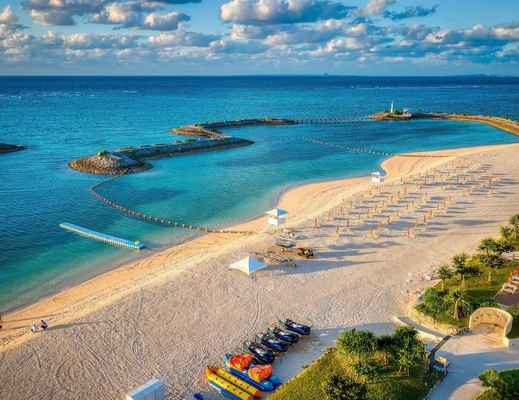


Okinawa
Asia
/
Japan
/
Okinawa
Okinawa, the southernmost prefecture of Japan, is a subtropical island paradise known for its pristine beaches, vibrant coral reefs, and unique culture influenced by its proximity to mainland Asia. With a warm, humid climate year-round, this island chain offers the perfect escape for those seeking an exotic tropical getaway. Beyond its natural beauty, Okinawa boasts a rich history and heritage that sets it apart from the rest of Japan, with its own distinct cuisine, traditional arts, and way of life.
The local Ryukyu culture, deeply rooted in Okinawan society, is a fascinating blend of Japanese and Chinese influences. Visitors can immerse themselves in this unique cultural tapestry by exploring ancient castles, witnessing traditional Eisa dance performances, and savoring the renowned Okinawan cuisine, which features locally-grown ingredients like purple sweet potatoes, bitter melon, and pork belly. One of the signature experiences in Okinawa is the opportunity to witness the breathtaking underwater world of the Kerama Islands, renowned for their vibrant coral reefs and diverse marine life.
Among the must-visit attractions are the iconic Shuri Castle, a UNESCO World Heritage Site that was once the royal palace of the Ryukyu Kingdom, and the Churaumi Aquarium, one of the largest in the world, showcasing the incredible biodiversity of the Okinawan seas. For adventurous travelers, the rugged Yanbaru National Park offers opportunities for hiking, camping, and encountering the native Yanbaru kuina, a rare species of rail bird found only in this region.

Travel Tips for Okinawa
What you need to know before traveling here
Getting Around Okinawa
A guide to Okinawa's local transportation
Okinawa's monorail system, known as the Yui Rail, is a convenient and efficient way to navigate the main island's urban areas. The rail system connects major cities like Naha and Urasoe, making it easy to travel between popular destinations. Travelers can purchase rechargeable IC cards like the OKICA or use cash to pay for individual rides.
Practical Tips for Okinawa
Things to prepare and best way to visit
The best time to visit Okinawa is typically between March and June, or September to November. During these periods, the weather is mild and pleasant, with warm temperatures and lower humidity levels.
While major credit cards are widely accepted in Okinawa, especially at hotels, restaurants, and larger establishments, it's always a good idea to have some cash on hand for smaller purchases or when venturing to more remote areas.
The local currency is the Japanese yen (JPY). For a comfortable mid-range budget, plan to allocate around 10,000 to 15,000 JPY (approximately $80 to $120) per day for accommodation, meals, and activities.
While learning a few basic Japanese phrases can be helpful, English is widely spoken in major tourist areas and at most hotels and restaurants in Okinawa. However, having a phrasebook or translation app can still be useful when venturing off the beaten path.
Okinawa is generally considered a safe destination for solo travelers. However, it's always advisable to exercise caution, especially in crowded areas or at night, and be mindful of your surroundings.
See All Practical Tips for Okinawa

Explore Okinawa
Create your itinerary with our top picks below

Travel Tips for Okinawa

Explore Okinawa
More Destination Near Okinawa














 Facebook
Facebook Instagram
Instagram TikTok
TikTok Youtube
Youtube Telegram
Telegram
